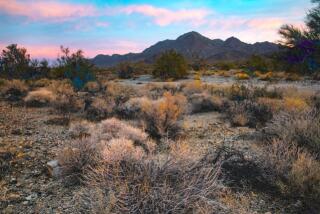A Flowering in the Desert : All-important protection bill faces key committee vote
- Share via
Moving as slowly as a desert tortoise--but perhaps every bit as inexorably--a key U.S. Senate committee is finally approaching a vote on legislation that would help preserve 6.6 million acres of California desert for future generations.
It has taken almost seven years, and the efforts of three California senators, but with any luck the Senate Energy and Natural Resources Committee next week will approve the California Desert Protection Act, SB 21.
The legislation would create the largest wilderness area in the lower 48 states, enlarging both the Death Valley and Joshua Tree national monuments and upgrading them to national park status. It would also create a 1.5-million-acre East Mojave National Park, bounded roughly by the Nevada border and Interstate Highways 15 and 40.
All told, California has something like 25 million acres of desert terrain in the expanses that sprawl from the Inyo Mountains to Imperial County.
The pressure of economic development--like mining--and recreational activities--like hunting and dirt-biking--has motivated concerned Californians to seek to preserve some of this gorgeous and primitive land.
Much of the resistance to the Desert Protection Act-- introduced by now-retired Democratic Sen. Alan Cranston and currently backed by the state’s two senators, Democrats Dianne Feinstein and Barbara Boxer--comes from groups that fear it would bar them from the desert entirely. It does not. It merely restricts activities like hunting to designated areas outside the new national parks. And, as noted, there is still plenty of space in the state’s deserts.
Earlier this week the Senate committee defeated efforts by critics of the bill to dilute it with amendments, including one that would have reduced the proposed Mojave national park to the status of a monument. That, along with the support of committee chairman J. Bennett Johnston (D-La.), Sen. Ben Nighthorse Campbell (D-Colo.) and Interior Secretary Bruce Babbitt, are hopeful signs that the Desert Protection Act will finally become law.
More to Read
Sign up for Essential California
The most important California stories and recommendations in your inbox every morning.
You may occasionally receive promotional content from the Los Angeles Times.










